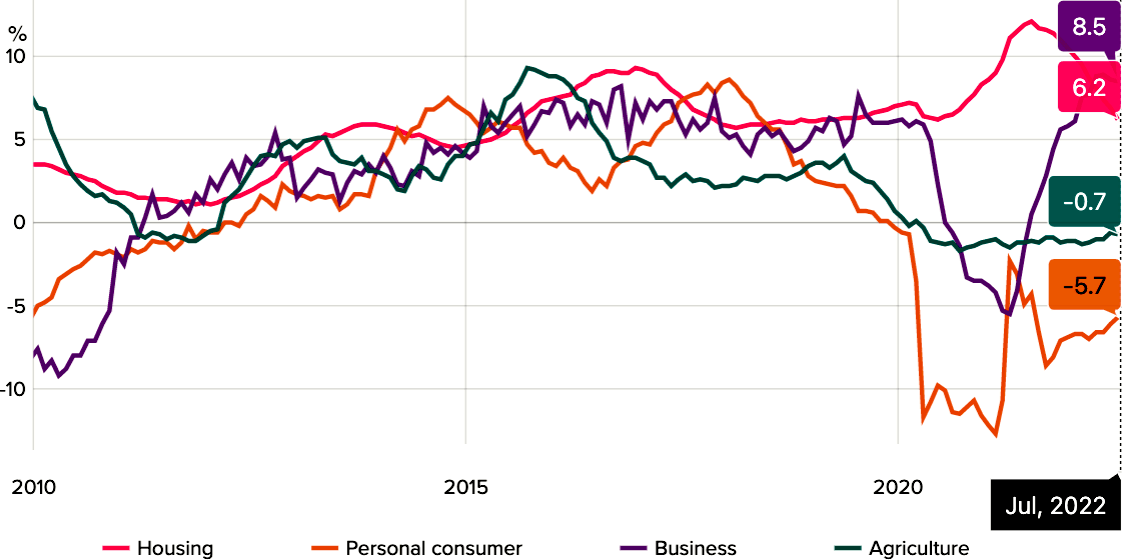
Despite urgent attempts to fix the Credit Contracts Act, banks say they are constrained in providing assistance like emergency overdraft extensions to customers
Bank customers will have greater difficulty borrowing money when they need it most, despite work by the Government and finance sector to tidy up the new Credit Contracts and Consumer Finance Act.
New Zealand Bankers’ Association chief executive Roger Beaumont says banks can no longer help customers who might need a low-interest loan for an emergency, and the Government did not address this issue in its recent announcement on further changes to the Act.
“Banks have no flexibility to extend credit to customers without a full affordability assessment, which customers are more likely to fail when facing financial difficulty."
He says banks used to be able to provide low-value short-term overdrafts, for example to help customers with an urgent health problem or house fix, as was the case with the Christchurch earthquakes.
"In these cases, banks could do that by looking at the customer’s credit history and particular circumstances, and seeing a way through. That’s no longer possible. Banks have lost the discretion they used to have to act in the best interests of the customer in a challenging situation."
BNZ chief executive Dan Huggins agrees the Government has made no move to free up banks to provide emergency loans or overdraft extensions.
He believes the new law could more effectively target predatory high-interest lenders, rather than its sweeping coverage of all borrowers. The Government has moved to adjust the settings on the new law, after concerns that banks were required to ask intrusive questions, such as how much borrowers had spent at KFC in the previous three months.
In a report, MBIE officials have recommended further investigation into targeting the lenders.
BNZ is working with Good Shepherd NZ and the Ministry of Social Development, providing low and no interest loans to help New Zealanders respond to the unexpected, and stay away from predatory lenders. Together, they've committed $60 million in lending to 'Good Loans' microfinance and other community finance initiatives.
"Yes, some people will go to high street lenders, but for other people it will be the tipping point for them to go and seek help and go to a financial mentor." – Nicola Eccleton, Good Shepherd NZ
When bank staff manage their response to loan applications well, they can steer people to good advice rather than inadvertently thrusting them into the arms of loan sharks.
"People have different things going on," says Good Shepherd social inclusion manager Nicola Eccleton. "So yes, some people will go to high-street lenders, but for other people it will be the tipping point for them to go and seek help and go to a financial mentor."
From next month, Good Shepherd and BNZ will offer zero interest loans of up to $15,000 with no fees, no interest and no penalties, just for essential items and debt consolidation.
Jake Lilley, senior policy advisor at financial mentors grouping FinCap, says some of those back-street lenders offer loans with interest rates pushing up towards the new limit of 292 percent per annum. That sounds outrageous, and it is, but when it's presented as a daily rate (0.8 percent) to an individual or small business operator struggling for finance, it may not sound so scary.
There are disclosure requirements, he says, but often these loans are made to people who are stressed. "A classic example I hear is someone who needs a car within the next week. They're sitting in a car yard after getting their kids there, all the rest of the things you do when you don't have a car already, and a salesman saying, 'oh, we're closing in five minutes, you need to find this quickly'."
"Where a bank lender, through a robust process, has turned down lending as it was unaffordable then another lender approving a more expensive option will be subject to the exact same requirements and have some serious questions to answer," Lilley says. "Especially where this leads to a whānau going without kai, to pay."
Despite the criticism from those in more secure financial situations, he and Eccleton agree the new Credit Contracts law and regulations are helping financial mentors fix up the messes caused by predatory lenders much more efficiently, with far less stress for the whānau they assist.

Huggins is very clear that he and the bank are 100 percent supportive of the objective of the new law, but there remain a few wrinkles still to smooth. "If you want to extend further credit to someone, even for one of those emergency situations, you need to do a full servicing assessment. And they must pass that servicing assessment. Otherwise, you're in breach of this regulation."
He says the bank is talking with officials, and they agree this is an area that should be fixed.
"We see the intent of the CCCFA as being the right intent. You want to ensure that customers can afford their loans – that's in everyone's interest. It's in a customer's interest and it's certainly in my interest to make sure the customer can afford to pay their loan back.
"I think New Zealand banks traditionally have been very good at that. We haven't seen huge arrears, when you compare the New Zealand banks and the BNZ to others globally."
But the regulations still limit, quite substantially, banks' discretion on lending decisions. "And so that knowledge that we've built up over 160 years, of what is a good thing to do, is restricted under the new legislation. And as you say, it means that credit availability is lower."
In a Cabinet paper, Commerce Minister David Clark says financial mentors tell him that an unexpected expense may push people over the edge, "going without essentials or living off food parcels in order to meet payments". He has declined to target specific high-risk lenders, or to rule out safer bets like banks and mortgage lending.
WATCH PRO TALKS:
* BNZ appeals to businesses to ‘talk to us’ as their costs rise
* Green bank to invest in energy generation through ‘novel’ product
* Ambassador champions China’s increased security presence in the Pacific
* Z Energy boss Mike Bennetts predicts the rapid decline of petrol
* Naomi James offers Marsden Point oil tanks for national fuel reserve
* Economist Jarrod Kerr on why it’s hard to build out of the housing crisis
* The climate clock is ticking, say world's top negotiators
* Rod Oram says NZ farmers shouldn’t feel picked on at COP26
* Ports chair Jan Dawson warns of supply chain delays at Christmas
* Covid aide Rob Fyfe: ‘Now’s not the time to pat ourselves on the back’
* NZ Rugby boss Mark Robinson on Ineos, Silver Lake and cost of rugby

Newsroom Pro Talks is made with the support of Spark.
Pro Talks is a live webinar series that looks at the crunchy part of big picture issues with the people whose decisions have a wider impact than just their own companies or enterprises. Hosted via Zoom, subscribers can watch our journalists interview industry leaders live and add their questions to the discussion.
To get access to future Pro Talks, subscribe here to Newsroom Pro.







